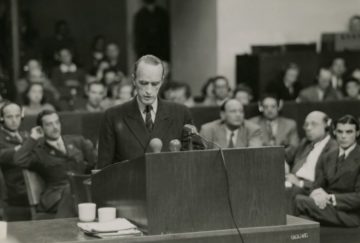Erica X Eisen in the Boston Review:

On April 14, 1945, as a group of American soldiers were leading him down the road in the village of Wittbräucke, German steel magnate Albert Vögler bit into a concealed cyanide ampoule, collapsed against an armored car, and died almost instantly. “I am ready to take part in the reconstruction of Germany,” he had told fellow industrialist Friedrich Flick earlier that year. “But I will never let myself be arrested.” Across the country, businessmen were doing the same thing: Siemens alone saw five of its board members kill themselves as the Red Army advanced through the streets of Berlin and captured its factory.
Those industrialists who remained behind, shredding documents and wrenching portraits of Hitler off the walls, would soon find themselves on the list of candidates for war crimes prosecution at Nuremberg—executives from Krupp, IG Farben, Daimler-Benz, Volkswagen, and elsewhere whose companies had collectively smelted steel for tanks and purified aluminum for gunbarrels, formulated the synthetic rubber and gasoline necessary for tires and engines, built airplanes and U-boats and V-2 rocket circuit boards, and manufactured nerve gas and Zyklon B. They had seized Jewish property and swallowed up businesses sold off for pennies by those fleeing Nazi persecution. They had contracted with the German government to exploit the labor of concentration camp internees and sited factories with the specific goal of better leveraging this free and disposable workforce. They had planned, profited from, and above all else made possible the Nazi war machine and its genocides.
More here.
